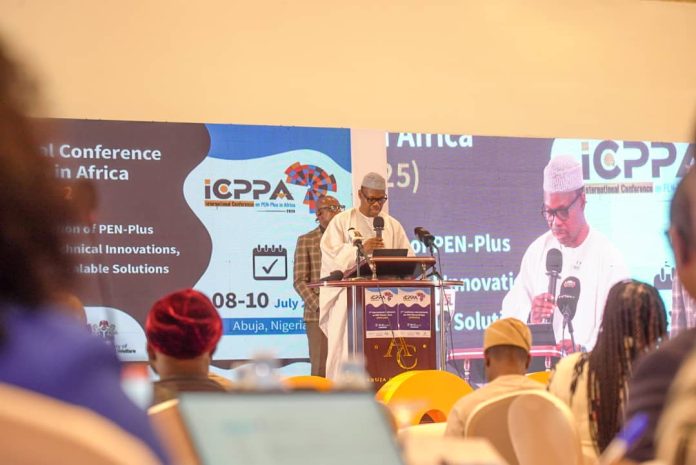By Emmanuella Oghenetega
The Federal Government of Nigeria has reaffirmed strongly, its commitment to combating the rising burden of severe non-communicable diseases (NCDs) in the country and across Africa as it hosted the 2nd International Conference on PEN-Plus in Africa (ICPPA 2025) from July 8 to 10 in Abuja.
Delivering the keynote address, the Minister of State for Health and Social Welfare, Dr. Iziaq Adekunle Salako, emphasized the urgency of addressing severe NCDs : Type 1 Diabetes Mellitus, Sickle Cell Disease and, Rheumatic Heart Disease through the PEN-Plus strategy, an initiative supported by the World Health Organization (WHO) to improve access to life-saving care at the first referral level of care.
“Africa must rise to tackle the NCD burden not just as a health issue, but as a matter of human security, economic progress, and sustainable development,” Dr. Salako said, stressing that the strategy is in line with President Bola Ahmed Tinubu’s Renewed Hope Agenda, which prioritizes health as a human right.
Dr. Salako highlighted that NCDs account for 24–30% of deaths in Nigeria, disproportionately affecting people in their most productive years. He said the government has responded with policy actions including the National Policy and Strategic Plan of Action for the Prevention and Control of NCDs, task-shifting policies, and the Nigeria Essential Package of NCDs (N-PEN) at the primary healthcare level.
Dr. Salako appeal: “Let us be part of history by saving this generation and generations unborn from the financially devastating, emotionally traumatizing, and physically agonizing effects of these severe NCDs in our dear continent of Africa.”
In her welcome address, representing the Permanent Secretary Daju Kachallom; Federal Ministry of Health and Social Welfare, Pharmacist Olubunmi Aribeana Director Food & Drugs Services Department of the Ministry, reaffirmed the government’s dedication to reducing the impact of NCDs, particularly among children and adolescents.
“Every child with Type 1 Diabetes deserves insulin. Every adolescent with Sickle Cell Disease deserves comprehensive care. Every rural clinic must be empowered to manage complex NCDs,” she said.
She praised the efforts of WHO, African CDC, UNICEF, and other development partners, while acknowledging that severe NCDs remain an often-neglected area in many health systems.
Dr. Alex Gasasira, Acting WHO Representative in Nigeria, commended the Federal Government’s leadership and collaboration in hosting the conference, adding that WHO is committed to supporting PEN-Plus implementation.
Dr. Gasasira introduced a video message from the new WHO Regional Director for Africa, Prof. Mohamed Yacoub Janabi, who took office a week before the conference.
In his virtual address, Prof. Mohamed Janabi, WHO Regional Director for Africa, stated, that “Across Africa, the burden of severe NCDs is rising. Without treatment, these conditions are lifelong and often deadly,” he warned.
Janabi said thanks to support from partners like the Leona M. and Harry B. Hemsley Charitable Trust and the NCDI Poverty Network, 20 African countries have now expanded PEN-Plus services, benefiting over 15,000 patients. He cited Malawi as an example where six secondary-level facilities are offering PEN-Plus care and over 440 health workers have been trained.
“We must scale PEN-Plus to all 47 member states by investing in local health workers and ensuring that care is accessible to those who need it most,” he urged.
Attached Photo


